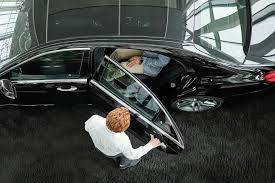A Car Dealer is a type of business that sells both new and used cars. These businesses are generally owned by a car manufacturer or its sales subsidiary, and employ automobile salespeople to sell their vehicles. A car dealership can also carry a number of Certified Pre-Owned vehicles, which are vehicles that have been certified by the carmaker. Click on Conklin Ford Newton-Wichita Ford Dealer
 Many car dealers also try to sell consumers extended warranties, tire and paint protection plans, gap insurance, and other similar products. While these services do add up, they often charge more than necessary. A better strategy is to avoid these services and negotiate directly with a dealer. However, it’s not always possible to negotiate directly with a dealer.
Many car dealers also try to sell consumers extended warranties, tire and paint protection plans, gap insurance, and other similar products. While these services do add up, they often charge more than necessary. A better strategy is to avoid these services and negotiate directly with a dealer. However, it’s not always possible to negotiate directly with a dealer.
The best way to negotiate with a Car Dealer is to focus on the price of the car you’re buying. Avoid asking how much you can afford to pay monthly, and try to get the full price of the car before you trade it in or make a down payment. The price listed on the window is often called the “MSRP” or manufacturer’s suggested retail price. If possible, try to negotiate from the invoice price, as this will be more favorable to you.
It’s also important to note that some states require car dealers to offer a “cooling off” period for customers. But, in most cases, this right is not available, unless the dealer offers it. You should always ask the Car Dealer whether this option is available to you. A money-back guarantee is another option that may be available to buyers. A “no-questions-asked” policy may also exist.
Customer satisfaction surveys are a great way to get feedback from satisfied customers and make improvements in your dealership’s processes. This will keep customers coming back. It’s also important to know the demographic of your customers. For example, younger buyers are less brand loyal and more likely to look for features rather than brand. So it’s important to make sure your car dealership caters to these buyers.
The owner of a car dealership is called the dealer principal, and typically appoints a general manager for each store. In some cases, the manager will purchase shares in the business as a minority partner. In addition, car dealerships often pay sales staff commission. Sometimes, they even award bonuses for meeting quotas or achieving an unusually high profit on a particular sale.
A car dealership’s sales staff is not out to rip you off, but it’s still important to protect yourself from being scammed. If you’re aware of the common tricks used by car dealers, you’ll be better prepared for any situations. For instance, don’t get pressured into signing a contract with a dealership that doesn’t accept your financing.
Car dealerships receive a small amount of money from manufacturers after a sale. This money is usually $200 to $400, depending on the invoice price of the car. These funds are designed to help them cover their costs and make a profit on a sale.
